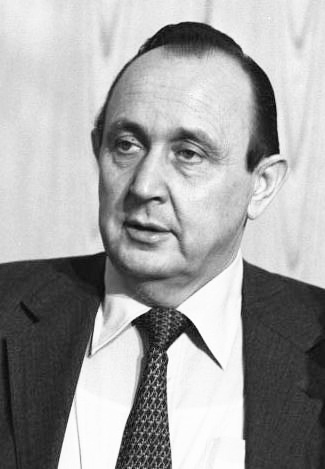
Hans-Dietrich Genscher
Hans-Dietrich Genscher (21 March 1927 – 31 March 2016) was a German statesman and a member of the liberal Free Democratic Party (FDP), who served as Federal Minister of the Interior from 1969 to 1974, and as Federal Minister for Foreign Affairs and Vice Chancellor of Germany from 1974 to 1992 (except for a two-week break in 1982, after the FDP had left the Third Schmidt cabinet), making him the longest-serving occupant of either post and the only person to have held one of these positions under two different Chancellors of the Federal Republic of Germany. In 1991 he was chairman of the Organization for Security and Co-operation in Europe (OSCE).
Hans-Dietrich Genscher
31 March 2016 (aged 89)
Wachtberg, Germany
Free Democratic Party of Germany (1952–2016)
Nazi Party (until 1945)
Liberal Democratic Party of Germany (GDR) (1946–1952)
Politician
A proponent of Realpolitik, Genscher has been called "a master of diplomacy".[1] He is widely regarded as having been a principal "architect of German reunification".[2] In 1991, he played a pivotal role in international diplomacy surrounding the breakup of Yugoslavia by successfully pushing for international recognition of Croatia, Slovenia and other republics declaring independence, in an effort to halt "a trend towards a Greater Serbia".[3] After leaving office, he worked as a lawyer and international consultant. He was President of the German Council on Foreign Relations and was involved with several international organisations, and with former Czech President Václav Havel, he called for a Cold War museum to be built in Berlin.
Biography[edit]
Early life[edit]
Genscher was born on 21 March 1927 in Reideburg (Province of Saxony), now a part of Halle, in what later became East Germany. He was the son of Hilda Kreime and Kurt Genscher.[4] His father, a lawyer, died when Genscher was nine years old.[5] In 1943, he was drafted to serve as a member of the Air Force Support Personnel (Luftwaffenhelfer) at the age of 16. At age 17, close to the end of the war, he and his fellow soldiers became members of the Nazi Party due to a collective application (Sammelantrag) by his Wehrmacht unit. He later said he was unaware of it at the time.[6]
Late in the war, Genscher was deployed as a soldier in General Walther Wenck's 12th Army, which ostensibly was directed to relieve the siege of Berlin. After the German surrender he was an American and British prisoner of war, but was released after two months.[7] Following World War II, he studied law and economics at the universities of Halle and Leipzig (1946–1949) and joined the East German Liberal Democratic Party (LDPD) in 1946.[8]
Political career[edit]
In 1952, Genscher fled to West Germany, where he joined the Free Democratic Party (FDP). He passed his second state examination in law in Hamburg in 1954 and became a solicitor in Bremen. During these early years after the war, Genscher continuously struggled with illness. From 1956 to 1959 he was a research assistant of the FDP parliamentary group in Bonn. From 1959 to 1965 he was the FDP group managing director, while from 1962 to 1964 he was National Secretary of the FDP.[5]
In 1965 Genscher was elected on the North Rhine-Westphalian FDP list to the West German parliament and remained a member of parliament until his retirement in 1998.[9] He was elected deputy national chairman in 1968. From 1969 he served as minister of the interior in the SPD-FDP coalition government led by Chancellor Willy Brandt.[5]
In 1974 he became foreign minister and vice chancellor, both posts he would hold for 18 years.[5] From 1 October 1974 to 23 February 1985 he was Chairman of the FDP. It was during his tenure as party chairman that the FDP switched from being the junior member of social-liberal coalition to being the junior member of the 1982 coalition with the CDU/CSU. In 1985 he gave up the post of national chairman.[10] After his resignation as Foreign Minister, Genscher was appointed honorary chairman of the FDP in 1992.[11]
Federal Minister of the Interior[edit]
After the federal election of 1969 Genscher was instrumental in the formation of the social-liberal coalition of chancellor Willy Brandt and was on 22 October 1969 appointed as federal minister of the interior.
In 1972, while minister for the interior, Genscher rejected Israel's offer to send an Israeli special forces unit to Germany to deal with the Munich Olympics hostage crisis. A flawed rescue attempt by German police forces at Fürstenfeldbruck air base resulted in a bloody shootout, which left all eleven hostages, five terrorists, and one German policeman dead. Genscher's popularity with Israel declined further when he endorsed the release of the three captured attackers following the hijacking of a Lufthansa aircraft on 29 October 1972.[5][12]
In the SPD–FDP coalition, Genscher helped shape Brandt's policy of deescalation with the communist East, commonly known as Ostpolitik, which was continued under chancellor Helmut Schmidt after Brandt's resignation in 1974.[10] He would later be a driving factor in continuing this policy in the new conservative-liberal coalition under Helmut Kohl.[9]